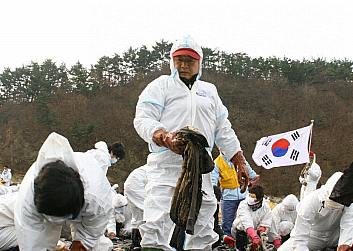Recently, I noticed that President Obama made an important announcement to the USA and the world about the BP Oil spill. Even outside of the US, I can see all of the blame and criticism he has taken for this disaster. In his speech he talked about how he would make sure that BP takes responsibility for the costs of damages resulting from the incident. The scale of the amount of land, people, and animals threatened by this spill is difficult for the mind to process. That’s why I see it as an opportunity for a different approach to problem-solving.
I experienced the aftermath of an oil spill in my home country in 2007. It was the first and biggest oil disaster in South Korea, but nothing like what we see today in the Gulf of Mexico. Many were involved in the clean-up project, including the oil company involved, government agencies, and environmental non-profits. I was there and I was most impressed by the people who came from all over the country to volunteer—students, housewives, everyday workers. They gave up their time and all of their individual comforts to join with others in saving our environment, our earth. They all undoubtedly knew that the disaster was the result of someone’s mistake, but they worked together with one mind prioritizing saving the environment over finding someone to blame.

Ilchi Lee helps clean up a 2007 oil spill in South Korea
The vastness of the current challenge is a wake-up call to every one of us. At this point, it is not difficult to find someone to hold responsible for the results of their choices and actions. However, that water, that land, and the wildlife in all of those states belong to all of us. It is everyone’s earth.
But so far, instead of making caring for the earth a top priority, we have built oil rigs and extracted crude oil to an extent that exceeds our needs. The recent catastrophe is more than an oil spill; it is perhaps an inevitable effect of unrestrained human desire for natural resources. This desire feeds and is fed by the global political and economic power structure that forms a tangled web around crude oil, directing its production and use.
Habitats damaged by the oil spill in the Gulf of Mexico must be restored as quickly as possible by focusing on the “possibilities” and through our collaborative efforts. But that will not stop another oil well pipe from causing an undersea gusher, contaminating the land and sea somewhere on the globe. I believe resolving what lies beneath the surface—the desire and obsession for materials deeply seated inside our brains–is the solution to the fundamental problem.
Since every problem is born from the human brain, the solutions to these problems can also be found in the brain. We know the brain’s potential is too great to be the exclusive property of our selfish desires. Depending on the choice we make, we can either use our brains to fulfill desire to the point of destruction or to engage in positive creation.
When we plant love for the earth in our brains—the willingness and desire to take care of and protect the planet—we will gain the power and wisdom for creative solutions to many of the challenges humanity is currently facing.
The only hope for this earth is us, humanity—and our brains.
